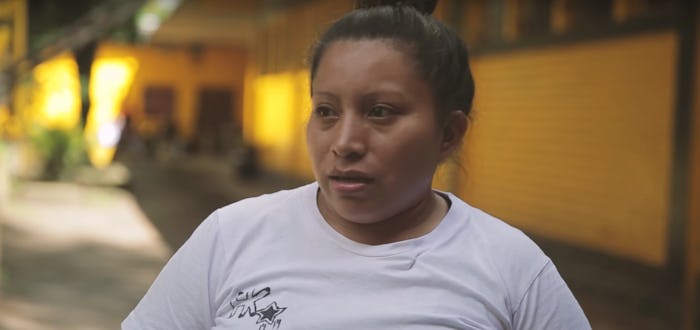News
This Woman Has Been In Prison For 10 Years For A Stillbirth, & Her Story Will Infuriate You
Suffering a miscarriage or a stillbirth can be one of the most traumatic experiences of a woman's life. The prospect of being publicly vilified for such a heartbreaking outcome, even prosecuted for it, is largely unfathomable in its cruelty to any woman who's lost a child that way. That is,except for a group of women in El Salvador living that reality, including Teodora del Carmen Vásquez, who lose her baby when she was nine months pregnant in 2007. Now, she has been in prison for 10 years for the stillbirth, and the same judges who convicted her of aggravated homicide a decade ago just ruled that she will have to serve her entire 30-year sentence. This barbaric decision came as a direct result of El Salvador's strict ban on abortion.
The court made its decision despite new medical evidence presented by Vásquez's lawyer that the baby girl girl was stillborn, and had not died of perinatal asphyxia after birth as a government autopsy had previously determined, The Los Angeles Times reported. The resurgence in the legal battle emerged 10 years after Vásquez, then 24, had experienced intense pain and bleeding while at work in a school cafeteria. She called emergency services, who did not show for hours. When they did, she had passed out and came to in the bathroom.
In a recent interview with Al Jazeera, Vásquez said that she did not even realize that she had given birth until after authorities took her away in handcuffs.
But her insistence that she did not strangle her baby — which would have been her second child — has not swayed the authorities in this ultraconservative country that is guided by evangelical Christian principles. As such, El Salvador is one of only a handful of countries worldwide where abortion is illegal under any circumstances, even in cases of rape and when the pregnancy could threaten the life of the mother. This creates a dangerous "environment of suspicion," as Al Jazeera's Elizabeth Melimopoulos and Ali Rae described it, in which medical providers are more likely to call the authorities on women seeking treatment for pregnancy complications or other reproductive health issues in order to protect themselves from prosecution.
Because of the fear El Salvador's abortion ban instills in medical providers, Vásquez is not the only woman who has been imprisoned for losing a pregnancy. She is one of El Salvador's "Las 17," a group of women sentenced to up to 40 years in prison for of having pregnancies that ended, according to the Centers for Reproductives, as the result of natural causes since the total abortion ban was enacted in 1999.
The draconian laws that subject women to decades in prison for miscarriages and still births affect poor women more or less exclusively, as they have limited access to basic resources as well as reproductive health care. Those of greater means can also more readily secure black market abortions, CNN reported. That's part of the reason that U.N. human rights spokeswoman Liz Throssell slammed the court's decision in the Vásquez case Friday, according to Reuters:
It is absolutely astounding, astonishing, appalling that these women are in essence being convicted of having a miscarriage, having a child stillborn. They are basically being convicted for being women, for losing a child and for being poor.
It's clear that something has to change in El Salvador, where the Center for Reproductive Rights insists that women's "legal and human rights [are] flagrantly disregarded by the Salvadoran government." Instead of being incarcerated for health complications they can't control, women must receive the medical care they need. That would start with repealing the regressive abortion laws in the country and actually believing women when they relay what happened to their bodies.
